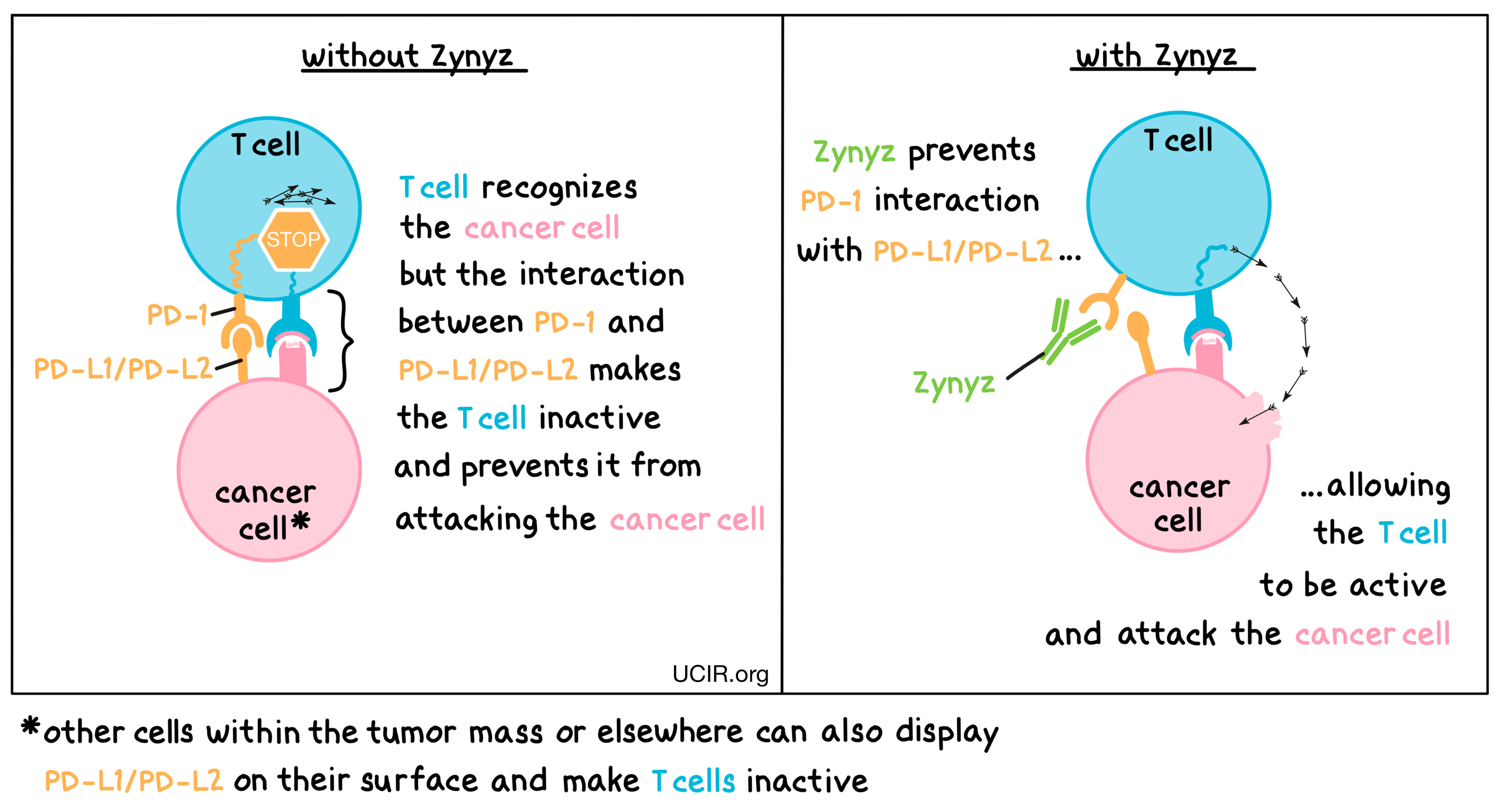How is this drug name pronounced?
Retifanlimab: REH-tih-FAN-lih-mab
Zynyz: ZY-niz
What cancer(s) does this drug treat?
Advanced Merkel cell carcinoma
Zynyz is approved for:
- Patients with Merkel cell carcinoma (a type of skin cancer) that has come back (recurrent) or spread to other parts of the body (metastatic).
Limitations of use
Age: The safety and efficacy of Zynyz in pediatric patients under 18 years of age have not been established.
Pregnancy/Breastfeeding: Zynyz can cause harm to a fetus, and is not recommended for use during pregnancy. Women are advised to use contraception during treatment, and for at least 4 months after the last dose of Zynyz. The risks associated with Zynyz during breastfeeding are not known and cannot be ruled out; due to the potential for serious adverse reactions in the breastfed child, patients are advised not to breastfeed during treatment and for 4 months after the last dose of Zynyz.
Complications of stem cell transplant: Serious and life-threatening complications that can lead to death can occur in patients who have received a stem cell transplant from a stem cell donor before or after being treated with Zynyz. The benefit of treatment with Zynyz versus the possible risk of transplant-related complications (especially in patients with a history of graft-versus-host disease) should be carefully considered.
Solid organ transplant rejection: Treatment with Zynyz can increase the risk of rejection in patients who have received an organ transplant.
What type of immunotherapy is this?
How does this drug work?
Zynyz is an antibody that attaches to a molecule called PD-1, which is present on the surface of T cells – the primary immune cells involved in killing cancer cells. In healthy tissues, PD-1 acts as a brake that keeps T cells from creating an immune reaction that gets out of control. However, cancers can hijack this safety mechanism and prevent T cells from doing their job – killing the cancer cells. This can happen when cancer cells or other cells within the tumor mass display on their surface molecules called PD-L1 or PD-L2. When PD-L1 or PD-L2 interact with PD-1 on T cells, the T cells become inactive and do not attack the cancer cells. Zynyz binds to the PD-1 molecules on T cells in such a way that it prevents the interaction between PD-1 and PD-L1/PD-L2, and allows the T cells to be active and attack the cancer cells.

How is this drug given to the patient?
Zynyz is administered via a tube into a vein (intravenous infusion, or I.V.) over 30 minutes every four weeks for up to 2 years, unless the disease gets worse or treatment is not tolerated. Treatment with Zynyz does not require a hospital stay.
What are the observed clinical results?
It is important to keep in mind that each patient’s actual outcome is individual and may be different from the results found in the clinical studies described below. In addition, with immunotherapy, sometimes it takes several months for responses to be observed.
Advanced Merkel cell carcinoma
In a clinical trial, 65 patients with Merkel cell carcinoma that has come back (recurrent) or spread to other parts of the body (metastatic) who had not received treatment for their advanced disease, were treated with Zynyz.

What are the side effects?
The most common side effects of Zynyz include fatigue, rash, itching, pain (in the muscles, bones, and joints), diarrhea, nausea, and fever.
Zynyz can cause the patient’s T cells to attack healthy cells throughout the body. Because of this, Zynyz can cause side effects that can become serious or life-threatening, and may lead to death. Some of the serious side effects related to Zynyz include inflammation of the lungs, liver, brain, kidneys (which can lead to kidney failure), or colon (which can result in tears or holes in the intestine). Additionally, problems can arise with hormone glands (including thyroid, pituitary, and adrenal glands, as well as the pancreas). Zynyz may cause Type 1 diabetes. Skin rash (which could become severe and life-threatening), and reactions related to the infusion may also occur. Patients should report any symptoms to their healthcare provider, who can then initiate actions to limit or reverse the side effects.
For a more complete list of possible side effects, see the full prescribing information.
Manufacturer
Incyte
Approval
FDA and EMA
Links to drug websites
Last updated: March 24, 2023
How is this drug name pronounced?
Retifanlimab: REH-tih-FAN-lih-mab Zynyz: ZY-niz
What cancer(s) does this drug treat?
Advanced Merkel cell carcinoma
Zynyz is approved for:
- Patients with Merkel cell carcinoma (a type of skin cancer) that has come back (recurrent) or spread to other parts of the body (metastatic) and cannot be cured with radiation or surgery. In this case, Zynyz may be used as a first treatment for the advanced disease.
Limitations of use
Age: The safety and efficacy of Zynyz in pediatric patients under 18 years of age have not been established.
Pregnancy/Breastfeeding: Zynyz can cause harm to a fetus, and is not recommended for use during pregnancy. Women are advised to use contraception during treatment, and for at least 4 months after the last dose of Zynyz. The risks associated with Zynyz during breastfeeding are not known and cannot be ruled out; due to the potential for serious adverse reactions in the breastfed child, patients are advised not to breastfeed during treatment and for 4 months after the last dose of Zynyz.
Complications of stem cell or solid organ transplant: Serious and life-threatening complications, including transplant rejection, can occur in patients who have received a stem cell transplant or solid organ transplant from a donor before or after being treated with Zynyz. The benefit of treatment with Zynyz versus the possible risk of transplant-related complications (especially in patients with a history of graft-versus-host disease) should be carefully considered.
What type of immunotherapy is this?
How does this drug work?
Zynyz is an antibody that attaches to a molecule called PD-1, which is present on the surface of T cells – the primary immune cells involved in killing cancer cells. In healthy tissues, PD-1 acts as a brake that keeps T cells from creating an immune reaction that gets out of control. However, cancers can hijack this safety mechanism and prevent T cells from doing their job – killing the cancer cells. This can happen when cancer cells or other cells within the tumor mass display on their surface molecules called PD-L1 or PD-L2. When PD-L1 or PD-L2 interact with PD-1 on T cells, the T cells become inactive and do not attack the cancer cells. Zynyz binds to the PD-1 molecules on T cells in such a way that it prevents the interaction between PD-1 and PD-L1/PD-L2, and allows the T cells to be active and attack the cancer cells.

How is this drug given to the patient?
Zynyz is administered via a tube into a vein (intravenous infusion, or I.V.) over 30 minutes every four weeks for up to 2 years, unless the disease gets worse or treatment is not tolerated. Treatment with Zynyz does not require a hospital stay.
What are the observed clinical results?
It is important to keep in mind that each patient’s actual outcome is individual and may be different from the results found in the clinical studies described below. In addition, with immunotherapy, sometimes it takes several months for responses to be observed.
Advanced Merkel cell carcinoma
In a clinical trial, 101 patients with Merkel cell carcinoma that had come back (recurrent) or spread to other parts of the body (metastatic) and who had not received treatment for their advanced disease, were treated with Zynyz. At a median follow-up of 18 months:

What are the side effects?
The most common side effects of Zynyz include fatigue, diarrhea, anemia (reduced red blood cells), itching of the skin, joint pain, constipation, nausea, fever, and decreased appetite.
Zynyz can cause the patient’s T cells to attack healthy cells throughout the body. Because of this, Zynyz can cause side effects that can become serious or life-threatening, and may lead to death. Some of the serious side effects related to Zynyz include inflammation of the lungs, liver, brain, kidneys (which can lead to kidney failure), or colon (which can result in tears or holes in the intestine). Additionally, problems can arise with hormone glands (including thyroid, pituitary, and adrenal glands, as well as the pancreas). Zynyz may cause Type 1 diabetes. Skin rash (which could become severe and life-threatening), and reactions related to the infusion may also occur. Patients should report any symptoms to their healthcare provider, who can then initiate actions to limit or reverse the side effects.
For a more complete list of possible side effects, see the full prescribing information.
Manufacturer
Incyt
Approval
FDA and EMA
Links to drug websites
Last updated: October 10, 2025





